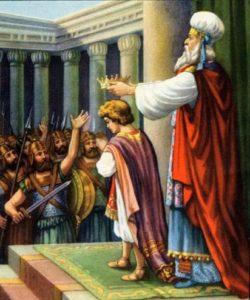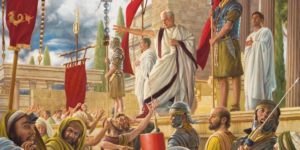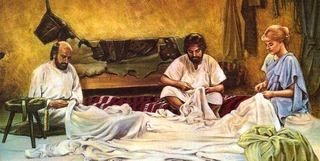TODAY’S READING FROM THE OLD TESTAMENT- 2 KINGS 10:32-12:21
Both the northern and southern kingdoms felt the idolatrous impact of the house of Ahab. As Ahab’s wife Jezebel instituted Baal worship in the northern kingdom of Judah, so her daughter, Athaliah, through her marriage to King Jehoram of Judah influenced the southern kingdom. Athaliah’s son, Ahaziah, succeeded Jehoram as king of Judah, making him the first Judahite king to be both a descendent from the house of David and the house of Omri (father of Ahab).
Jehu killed Jehoram of Israel and destroyed the worship of Baal there. Under the guise of hosting a worship gathering for Baal, Jehu assembled all those who served Baal. He asked them to bring their vestments and paraphernalia, separating them from the worshipers of Yahweh, and then ordered that they all be killed. The pillar of Baal was burned, and the house of Baal destroyed with all the worshipers inside. He also ordered the death of King Ahaziah of Judah, Ahab’s son-in-law. Athaliah, Ahaziah’s mother, usurped the throne of Judah, killing all the possible heirs, all her own adopted family by marriage. God providentially preserves the single link left in the chain of Davidic descendants in the Judahite dynasty. Satan attempted to thwart God’s plan to preserve the royal seed of David through Athaliah’s murderous plan. Then God’s grace intervenes. We read these words: “But Jehosheba”.
Jehosheba, Ahaziah’s sister, finds the infant Joash (also called Jehoash) and hides him for six years in a room in the house of the Lord, while the evil Athaliah rules in Judah.
The seed of David is secretly preserved. In the seventh year, the chief priest in the house of the Lord, Jehoiada, made a covenant with an assembly of Carites, who were elite mercenaries, together with other guards, and arranged for Joash to be installed as King of Judah. Jehoiada rallies these forces and equips them to protect Joash as he is crowned.
When Athaliah hears the trumpets and cheering of the people, she goes to the house of the Lord and discovers that the seven-year-old, Joash, has been proclaimed King of Judah. She echoes the cries of her mother, Jezebel, shouting “Treason! Treason!” while Jehoiada orders that she be taken out of the house of the Lord and put to death.
Jehoash (Joash) reigns for 40 years. For a good part of those years he was guided by the counsel of the chief priest Jehoiada. We learn that he did what was right in the eyes of the Lord all his days in which Jehoiada the priest instructed him. One big exception was that he failed to destroy the high places where people offered sacrifices and burned incense. The passage in 2 Chronicles 24:15-23 tells us that Jehoash turned to idolatry when Jehoida died. He listened to ungodly counsel, worshiped the Ashorim, and did not heed the warnings of the prophets (2 Chronicles 14:17-19).
Joash is recognized as the one who championed the repair of the temple. He spearheads the fund-raising, encouraging that the census money (Exodus 20:13), the assessment money/tax (Leviticus 27:2) and freewill offerings (2 Kings 12:4- ‘that which any man’s heart prompts him to bring’) be collected for the purpose of giving God due worship.
There seems to be some slippage in the administration of the repair project, as money is collected. In Joash’s 23rd year of reigning, he notices that the work has not yet begun. Joash rebukes them for being negligent. The priests agree to stop collecting money but do not agree to repairing the temple.
Jehoiada, the chief priest, springs into action. He makes a collection chest to put by the altar and then ensures that the money is collected and given to the workers as compensation for their carpentry and craftsmanship. People are more willing to give when they can see that the money is being used for the purpose for which it has been given. The building project had not been delayed because of a lack of money, but because of poor money management.
There is an indication that Joash, although intending to do the right thing, had a habit of submitting to the more powerful personalities around him. He submitted to the godly counsel of Jehoiada, but also caved into the ungodly counsel Judean officials (2 Chronicles 24:17), and the intimidating power of Hazael of Aram. Jehoash foolishly offered all the sacred things and gold of the temple and the king’s house and sent it to him, hoping that dissuade him from conquering Jerusalem.
By this time Hazael had not only taken the lands east of the river Jordan, but also Gath to the west of Jerusalem. Danger seemed imminent.
TODAY’S READING FROM THE NEW TESTAMENT – ACTS 18:1-22
In today’s reading Paul moves from Athens to Corinth.
At Corinth, Paul is introduced to a couple who will become prominent in the work of the gospel in Europe, Aquila and Priscilla. Like Paul, they are tent-makers. They had been living in Rome, but when Jews were extradited by order of the Emperor Claudius, they moved to Corinth.
Paul begins his ministry continuing the pattern of proclaiming the message to the Jew first. He reasons with the Jews and God-fearing Gentiles in the synagogue. When Silas and Timothy join him, Paul leaves off tent-making for a while and devotes himself completely to the ministry of the Word, “solemnly testifying to the Jews that Jesus is the Christ” (Acts 18:5).
However, he meets stubborn resistance, so he shakes out his garments with these woeful words reminding them of their accountability before God: “Your blood be on your own heads! I am clean. From now on I will go to the Gentiles.”
He moves his ministry next door to the home of Titius Justus, a worshiper of God. The leader of the synagogue, Crispus, and his entire household believe the gospel and many Corinthians are brought to faith in Christ and are baptized.
Paul receives great encouragement to carry on the work.
Acts 18:9-10 9 And the Lord said to Paul in the night by a vision, “Do not be afraid any longer, but go on speaking and do not be silent; 10 for I am with you, and no man will attack you in order to harm you, for I have many people in this city.”
We can be encouraged by God’s promises and God’s foreknowledge. He knows what we do not know of who is ready to hear the gospel. He knows when the fields are ripe and ready for the harvest. He knows when there remains a work for us to do. He knows how many remain in the city whose hearts are good soil for the sowing of God’s Word.
Paul ministers in Corinth for 18 months, “teaching the word of God among them” (Acts 18:11).
The religious controversy continues to boil, and the Jewish leaders unite to bring Paul to the judgment seat at Corinth. Gallio, however, recognizes that their dispute with Paul was over religious matters and not any civil offense. Therefore, he dismisses them from the Judgment Seat. The Jews then attack the synagogue leader, Sosthenes, with Gallio showing no more interest in their case.
Paul eventually leaves Corinth with Aquila and Priscilla. They travel to Cenchrea, where Paul cuts his hair and makes a vow, and then goes on to Ephesus. He leaves Priscilla and Aquila in Ephesus, where once again they will be useful in church planting as well as tentmaking, opening their home to the work of the gospel. Notice the reversal of the name order. First introduced as “Aquila and Priscilla” in Acts 18: 2, now Luke refers to them as “Priscilla and Aquila” (Acts 18:18), indicating that Priscilla had perhaps a more prominent role as she ministered with her husband. Paul obviously felt confident that they could minister well in Ephesus as he moved on to Caesarea and then to Antioch.
TODAY’S READING FROM THE BOOK OF PSALMS- PSALM 145:1-21
This Psalm praises God for His greatness. The Psalmist speaks of his daily habit to praise the Lord.
Psalm 145:2 2 Every day I will bless You, And I will praise Your name forever and ever.
There is no end to discovery of what is praiseworthy about the Lord. The Psalmist is confident that every generation will take up the harp of praise, commending His works from one generation to another.
Not only does the Psalmist have a daily habit of praise, but also a habit of meditation.
Psalm 145:5 5 On the glorious splendor of Your majesty And on Your wonderful works, I will meditate.
The Psalmist praises God’s attributes of majesty, greatness, goodness, graciousness, righteousness, mercifulness, patience, forbearance, steadfastness, love, faithfulness, kindness, integrity, generosity, attentiveness, nearness, sensitivity and His keeping power.
He calls upon all to praise Him with their mouths and to bless His holy name forever (145:21)
Psalm 145:10-13 10 All Your works shall give thanks to You, O LORD, And Your godly ones shall bless You. 11 They shall speak of the glory of Your kingdom and talk of Your power; 12 To make known to the sons of men Your mighty acts and the glory of the majesty of Your kingdom. 13 Your kingdom is an everlasting kingdom, And Your dominion endures throughout all generations.
TODAY’S READING FROM THE BOOK OF PROVERBS- PROVERBS 18:1
Proverbs 18:1 1 He who separates himself seeks his own desire; He quarrels against all sound wisdom.
Independent, unruly, selfish streaks sabotage a holy ambition. Be more ready to understand than be understood. Be swift to hear and slow to speak.
PRAY FOR THE NATIONS- (We are praying for the states of India. Pages 418-445 in “Operation World Prayer Guide”)
PRAYER: Father, Your greatness is unsearchable. Our days should be full of endless praise when we consider Who You are and meditate upon all Your works. May we be faithful to maintain heart-felt worship throughout this day, honoring Your Name at all times. Thank You for Your faithfulness to put the right man on the Throne, our Sacred Head, the Lord Jesus Christ. Thank You for the encouragement that You have a work for us to do. May we be faithful to obey You as Lord of the harvest and boldly go on speaking of You, sowing the good seed of Your Word. We trust that You still have people ready to hear Your message. May we be faithful to proclaim it. In Jesus’ Name. Amen.
